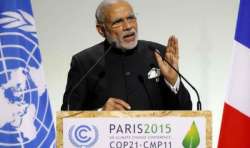Walking back from Paris climate deal can harm us all: India
Amid concerns that the Trump administration could withdraw the US from the ambitious Paris Climate agreement, India has said "walking back" from commitments made to implement the landmark deal "can harm us all".

Amid concerns that the Trump administration could withdraw the US from the ambitious Paris Climate agreement, India has said "walking back" from commitments made to implement the landmark deal "can harm us all".
The 2030 Sustainable Development Agenda and the Paris Agreement "explicitly acknowledge a collective responsibility along with the need to assist those who require support", Secretary (West) in the Ministry of External Affairs Sujata Mehta said at a high-level dialogue on synergies between the 2030 Agenda and Sustaining peace here yesterday.
She, however, voiced concern that developments following the adoption of the landmark agreements have been "less than encouraging".
"Regrettably, the signs of push-back on commitments by traditional donors towards assisting in the implementation of these two landmark agreements, that can actually and in very practical terms transform human societies, for our collective betterment, place a question mark on any such prospects. Walking back from commitments made can harm us all," she said.
US President Donald Trump, who assumed office last week, has expressed skepticism about climate change, raising concerns that he could withdraw the US from the Paris deal on combating global warming.
The new UN Secretary General Antonio Guterres had also said at the World Economic Forum in Davos last week that business was the "best allies" to shield the Paris climate deal from "the possibility of less supportive action of some governments", making a veiled reference to Trump.
Mehta said India is pushing strongly ahead with implementing an ambitious agenda on sustainable development and climate change, and to partner with developing countries and the UN for capacity building and other forms of assistance in longer term global development efforts.
She added that peace and security are now shared and indivisible concepts, which depend on longer term equitable sustainable development.
"This requires a strong commitment to the implementation of the SDGs by national governments, strongly facilitated by a spirit of genuine global partnership."
Addressing the event, Guterres highlighted the importance of recognising the links between sustainable development and sustaining peace amid such intertwined global challenges as rising inequality, protracted conflicts and climate change.
"We need a global response that addresses the root causes of conflict, and integrates peace, sustainable development and human rights in a holistic way - from conception to execution," Guterres said.
The universal nature of the 2030 Agenda - adopted by the Assembly in September 2015 as a plan to tackle poverty, inequality and other global challenges - and its pledge to leave no one behind ties it to sustaining peace, he explained.
"Our priority is prevention - prevention of conflict, of the worst effects of natural disasters, and of other manmade threats to the cohesion and wellbeing of societies," Guterres stressed, noting that the best means of prevention, and of sustaining peace, is inclusive and sustainable development.
(With PTI inputs )